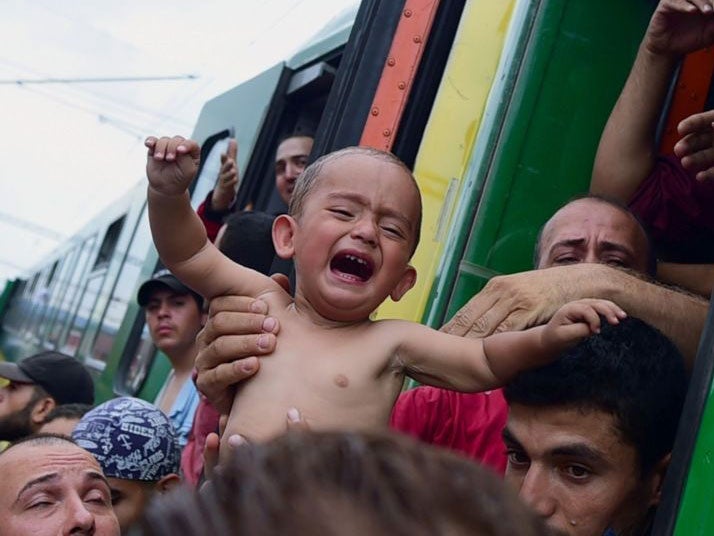If Britain deports the refugee children it takes in once they turn 18, everybody loses
Hundreds of orphans from Afghanistan have already been returned to their war-torn "homes" when they reach adulthood. This shameful policy shouldn't be repeated

It was during David Cameron’s address to Parliament this week on the subject of the refugee crisis that Lord Ashdown, former leader of the Liberal Democrats, suggested that the sanctuary Britain is set to offer vulnerable refugees displaced from Syria could be snatched away once they turn 18.
Offering vulnerable children a home in Britain, a British education, and British cultural assimilation, only to mean-spiritedly siphon hope away would surely contradict the very humanitarian ethics that Cameron purports to be upholding; not to mention that ardent talk of heeding the “depth of public feeling” will be shown to be yet another hollow promise if deportation schemes take place.
Talk of a continuation of the World War II Kindertransport scheme, meanwhile, is a distasteful appropriation of a significant historical event, used by Cameron in an attempt to lend credence to proposals that have been hailed as woefully inadequate. The organised rescue effort which took place in the nine months prior to the outbreak of WWII, and which saw the UK rehome nearly 10,000 predominantly Jewish children, often meant that the resettled children were sometimes the only members of their family to survive the Holocaust. Would we have willingly deported those children back to the site of unspeakable ethnic cleansing, after building new lives in Britain? Of course not. Yet in 2015, the question of possible deportation threatens refugees who are bound to become valuable members of society.
Writing on Twitter, Lord Ashdown claimed that a Minister in the House of Lords (Baroness Stowell), in response to questioning over the futures of children brought in under the refugee programme, confirmed that in keeping with current legislation, deportation for those refugees who come of age in the UK during their temporary residence would remain a possibility.
In his speech to MPs which announced that Britain will resettle 20,000 refugees over the course of the next five years, Cameron also claimed that Britain should “fulfil its moral responsibility” to help refugees. With rhetoric clinging firmly to that of compassion and tradition, he asserted that Britain “will continue to show the world that this country is a country of extra compassion, always standing up for our values and helping those in need”.
It makes no sense, then, from a moral, ethical or economic standpoint, to wash our hands of refugees who will have been afforded housing, education and loving foster families with which to forge a new life. The actions will only doubly brutalise the traumatised refugees we offer sanctuary to, uprooting them for a second time in their fractured lives. New generations would stand to learn a thoroughly toxic lesson in how the British treat people in need, after watching the establishment feed with one hand then take with the other.
We mustn’t forget that the deportation of young people back to their war-torn birth countries has already been taking place under our noses. Hundreds of orphans of the Afghanistan conflict who came to Britain unaccompanied have had their asylum claims rejected and been deported “home” once they turned 18 – in the majority of cases, to a “home” that doesn’t even exist anymore. Sadly, it seems the Home Office is well practised in forcibly returning asylum seekers back to dangerous countries after their temporary leave – in other words, their childhood - runs out. For many, the threat of homelessness, kidnap and torture at the hands of the Taliban looms large, with many former refugees made sitting targets because of cultural idiosyncrasies accrued during their Westernised childhood. It’s not just these young people’s futures that are bound by uncertainty; their very lives are at stake. Where did we get the idea that reaching adulthood means your eligibility for safety expires?
You can’t pick and choose whether to give someone a home or not depending on their age. You either do so, with the intent of offering permanent residence, or risk doing more harm than good. The #refugeeswelcome hashtag that has garnered phenomenal public support over the past weeks might well assume tragic irony if the harrowing places from which these refugees fled are forced to return upon their eighteenth birthdays.
True, there might not be automatic deportation for those who turn 18 - and there is possibility that refugees brought in under the resettlement programme will have their asylum renewed. But the problem of granting temporary leave to unaccompanied children without intent to properly assess each individual asylum case once a child turns 18, no matter what kind of life you’ve built for yourself in the years spent recovering from danger, is urgent.
Young refugees need to stay put, lest we risk wasting a massive pool of potential for the sake of our island mentality.
Join our commenting forum
Join thought-provoking conversations, follow other Independent readers and see their replies
Comments